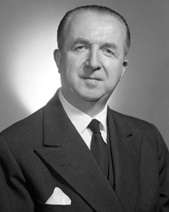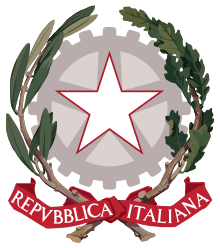Giuseppe Pella
| Giuseppe Pella | |
|---|---|
 | |
| 31st Prime Minister of Italy | |
|
In office 17 August 1953 – 18 January 1954 | |
| President | Luigi Einaudi |
| Preceded by | Alcide De Gasperi |
| Succeeded by | Amintore Fanfani |
| Minister of Foreign Affairs | |
|
In office 15 February 1959 – 25 March 1960 | |
| Prime Minister | Antonio Segni |
| Preceded by | Amintore Fanfani |
| Succeeded by | Antonio Segni |
|
In office 19 May 1957 – 1 July 1958 | |
| Prime Minister | Adone Zoli |
| Preceded by | Gaetano Martino |
| Succeeded by | Amintore Fanfani |
|
In office 17 August 1953 – 18 January 1954 | |
| Prime Minister | Himself |
| Preceded by | Alcide De Gasperi |
| Succeeded by | Attilio Piccioni |
| Minister of the Treasury | |
|
In office 2 February 1952 – 17 August 1953 | |
| Prime Minister | Alcide De Gasperi |
| Preceded by | Ezio Vanoni |
| Succeeded by | Silvio Gava |
|
In office 23 May 1948 – 26 July 1951 | |
| Prime Minister | Alcide De Gasperi |
| Preceded by | Gustavo Del Vecchio |
| Succeeded by | Ezio Vanoni |
| 3rd President of the European Parliament | |
|
In office 1954–1956 | |
| Preceded by | Alcide De Gasperi |
| Succeeded by | Hans Furler |
| Personal details | |
| Born |
18 April 1902 Valdengo, Piedmont, Italy |
| Died |
31 May 1981 (aged 79) Rome, Italy |
| Nationality | Italian |
| Political party | Christian Democracy |
Giuseppe Pella (18 April 1902 – 31 May 1981) was an Italian Christian Democratic politician who served as the 32nd Prime Minister of Italy from 1953 to 1954. He was also President of the European Parliament from 1954 to 1956 after the death of Alcide De Gasperi.[1] His economic and monetary policies in the ministry of finance based Italian reconstruction solidly on the best liberal traditions of Western capitalism.[2]
Biography
Giuseppe Pella was born in Valdengo, Piedmont. After graduation in Economy and Commerce, he adhered to the Christian Democracy (DC), in the right wing of the party. His first government position was as under-secretary of Finances in the II and III De Gasperi cabinets. In the IV De Gasperi he was Minister of Finances.
Pella was Minister of Treasure in 1948–1953, gaining the enmity of the Communist and Socialist parties, as well as some DC members due to his liberal and monetarist policies. After the political crisis caused by the failure of the Cheat Law, Pella was appointed Prime Minister in a deliberately provisional government. Pella gained further critics when, by issuing nationalistic declarations, he created strife with Josip Broz Tito regarding the Free Territory of Trieste. Pella resigned on 12 January 1954.
Later he was Minister of Foreign Affairs under Adone Zoli (1957–1958) and Antonio Segni (1959–1960), and Minister of Balance under Amintore Fanfani (1960–1962). Hostile to the alliance between DC and the Socialist Party, he retreated from frontline politics until 1972, when he became minister of Finances in the short-lived government led by Giulio Andreotti.
Pella was Senator until 1976. He died in Rome in 1981.
Notes
- ↑ Harris M. Lentz (2014). Heads of States and Governments Since 1945. Routledge. pp. 440–43.
- ↑ D. Ivone, "Giuseppe Pella e la politica liberista nella ricostruzione economica del secondo Dopoguerra." Rivista internazionale di storia della banca (1982): vol 24-25 pp 104-20.
Further reading
- Gilbert, Mark; Robert K. Nilsson (2010). The A to Z of Modern Italy. Scarecrow Press. pp. 340–41.
- Ivone, D. "Giuseppe Pella e la politica liberista nella ricostruzione economica del secondo Dopoguerra." Rivista internazionale di storia della banca (1982): vol 24-25 pp 104-20.
- Lentz, Harris M. (2014). Heads of States and Governments Since 1945. Routledge. pp. 440–43.
| Political offices | ||
|---|---|---|
| Preceded by Luigi Einaudi |
Italian Minister of Finances 1947–1948 |
Succeeded by Ezio Vanoni |
| Preceded by Gustavo Del Vecchio |
Italian Minister of the Treasury 1948–1951 |
Succeeded by Ezio Vanoni |
| Preceded by Luigi Einaudi |
Italian Minister of Budget 1948–1954 |
Succeeded by Ezio Vanoni |
| Preceded by Ezio Vanoni |
Italian Minister of the Treasury 1952–1953 |
Succeeded by Silvio Gava |
| Preceded by Alcide De Gasperi |
President of the Italian Council of Ministers 1953–1954 |
Succeeded by Amintore Fanfani |
| Preceded by Alcide De Gasperi |
Italian Minister of Foreign Affairs 1953–1954 |
Succeeded by Attilio Piccioni |
| Preceded by Alcide De Gasperi Italy |
President of the European Parliament 1954–1956 |
Succeeded by Hans Furler West Germany |
| Preceded by Gaetano Martino |
Italian Minister of Foreign Affairs 1957–1958 |
Succeeded by Amintore Fanfani |
| Preceded by Amintore Fanfani |
Italian Minister of Foreign Affairs 1958–1960 |
Succeeded by Antonio Segni |
| Preceded by Fernando Tambroni |
Italian Minister of Budget 1960–1962 |
Succeeded by Ugo La Malfa |
| Italian Chamber of Deputies | ||
| Preceded by None, Parliament re-established |
Member of Parliament for Turin Legislatures: CA, I, II, III, IV 1946–1968 |
Succeeded by Title jointly held |
| Italian Senate | ||
| Preceded by Title jointly held |
Italian Senator for Piedmont Legislatures: V, VI 1968–1976 |
Succeeded by Title jointly held |
.svg.png)

